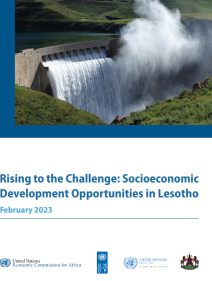As part of the process for developing the United Nations Sustainable Development Cooperation Framework for Lesotho (2024–2028), the present report contains a multidimensional diagnostic evaluation of the country’s national development context. Key trends in the social and economic development of the country over the past two decades are highlighted in order to identify areas of progress and opportunities, as well as the gaps and bottlenecks that Lesotho is facing in confronting and overcoming its socioeconomic development challenges. The present report shows that gender inequality in households shapes the terms and conditions under which women and men engage in work and care and how that inequality structures the operation of the economy in Lesotho. Most people in Lesotho, in particular in rural areas, work in crop and livestock production as small-scale farmers, but this livelihood has demonstrated mediocre improvements in productivity while being strongly affected by climate change and biodiversity loss. The report shows that this productivity record is replicated in industry, in particular in textile and apparel manufacturing and in services. Poor productivity performance is largely responsible for poverty in Lesotho and the country’s inadequate social development during the first two decades of the twenty-first century. Lying behind this economic record has been a marked deterioration in governance since 2012. In this context, the present report provides an outline of a comprehensive package of economic reforms that could improve social and human development in Lesotho. Improving agricultural productivity is the most important task facing policymakers, but there are opportunities to increase productivity in private sector-led and export-oriented manufacturing and tourism. Moreover, Lesotho should better leverage resources from water exports and diamond mining and create channels for the improved use of remittances to promote economic growth.
Share this:
Release Date:
15 February, 2023
© United Nations Economic Commission for Africa

